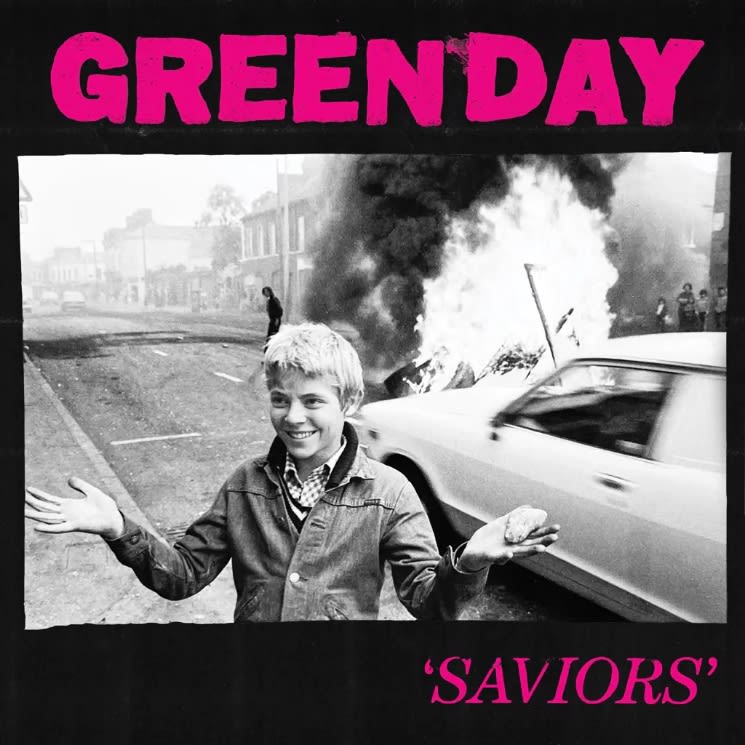What needs to be said about Green Day at this point? Billie Joe Armstrong, Mike Dirnt and Tré Cool are the multi-million-selling post-Nirvana saviours of alternative radio who blasted out of the Bay Area and wrote some of the most iconic rock songs of the last thirty years, opening the door for the wave of pop-punk that followed. From your Blink 182s to your Weezers, Avril Lavignes and Fall Out Boys — even Lady Gaga — Green Day's influence is all over the past three decades of popular music, even when the band itself is releasing less-than-stellar work.
And while it's not fair to compare any post-2005 Green Day album to their titanic heyday (Dookie sold 20 million copies, folks), Saviors, the band's latest outing, is their best work since they walked that lonely road 20 years ago.
Anthemic first single "The American Dream Is Killing Me" rolls along like the best of Thin Lizzy, before exploding into the album's first-of-many stadium-filling choruses. It's simple, it's catchy, and that damn string-infused bridge ("People on the street / Unemployed and obsolete / Did you ever learn to read the ransom note?") will never, ever, leave your brain. It ends as quickly as it starts, a fitting opener to an album that's a satisfying synthesis of Dookie and American Idiot: short, snappy songs with undeniable hooks, toeing the finest of lines between cheeky wordplay and political commentary.
The sinewy riff on "One Eyed Bastard" is full of sleazy crunch, with an unexpected sing-along section that, once again, will have my imagined Stadium Chorus™ reaching through the rafters. The bitter bubblegum of "Coma City" throws it back to punk's '80s heyday, and just when you think it'll rise to melodic heaven, the band throws in some unexpected dissonance to keep you on your toes. After 37 years, these old dogs will still bite you if you're not careful. On "Living in the 20's," Armstrong screams, "Ain't that a kick in your head!" with such unexpected, throat-shredding gusto that it feels corrosive, tearing a palpable hole through the track before everything collapses.
"1981" is one of the band's most sincere, punchy songs in years, a power-pop gem and an insta-setlist essential. Dirnt's bass playing is once again astounding (thank you for leaving the root-note-heavy basslines behind and bringing back those slithery riffs, we salute you!), and do we even need to talk about Tré Cool? He's an entirely underrated national treasure, and whether slamming through breakneck punk or adding subtle accents to lighter-worthy balladry ("Goodnight Adeline"), his playing was, is and always will be Green Day's adamantium backbone.
Green Day sound like they're actually having fun on Saviors, and that lightness comes through on every track. Even though they're taking notes from younger bands that they've clearly influenced ("Dilemma" is a song the Menzingers will be kicking themselves for not writing), the proceedings feel undeniably "Green Day."
The production (handled once again by the band with long-time collaborators Rob Cavallo and Chris Lord-Alge on production and mixing, respectively) is as big as it's ever been, particularly on the high-octane tracks. The unexpected instrumental flourishes — otherworldly keyboards, twinkling acoustic guitars, soaring strings and blaring horns — give these songs a sense of maturity and individuality. And even though its 15-song, 45-minute runtime may deter some less-than-focussed listeners, the album cuts a surprisingly quick pace: the longest song is four-minute album closer "Fancy Sauce," which, thanks to a searing tremelo'd solo, earns its length.
At times the lyrics border on bitter, which is perhaps expected of a 50+ year-old rock star. But Armstrong is both conscious and clever enough to subvert these easy expectations more often than not, lamenting the loss of Bowie and love, the rise of TikTok and conspiracy theories and the need for connection. Thankfully he's not above poking fun at himself, his country and his generation, particularly on "Strange Days Are Here to Stay" — "I just lost my sense of humor / Gen-Z killing, baby boomer now / Strange days are here to stay."
Not every song or line lands, and there are a small handful of mid-tempo rawkers and ballads that float by forgettably, sapping some of the necessary urgency that the more aggressive songs promise. Thankfully, these lulls are few and far between.
What sticks out most about Saviors is its unabashed honesty. Whether simple and straightforward or loaded with metaphor and irony, Armstrong's words fill the record with a sharp dose of sincerity. Sure, there are politics, but it's not as overwrought as American Idiot, nor as cynical. Yes, things are beyond godawful, but on Saviors there's a sense of collective hope and anger — there are people in our lives who make the world worth fighting for. It's not always easy striking that balance, but for the most part Saviors handles that dichotomy with a deft touch.
Even the last line on the album—"We all die young someday"—has that caustic, winking Green Day wit. It's all about how you feel, not how your knees feel, and Green Day will never grow old because they are, at heart, those snotty kids who wrote about masturbation, the Jesus of Suburbia and saying good riddance. Although there are still growing pains after almost 40 years, Green Day are back with a spiky, enthusiastic vengeance. And that's always a good thing.
Green Day Hit a Late-Career High on 'Saviors'

BY Marko DjurdjićPublished Jan 18, 2024
More Green Day
- Green Day Invite Fan to Play Guitar on "Good Riddance (Time of Your Life)," He Plays "Wonderwall" Instead
- Riot Fest Unveils 2025 Lineup with blink-182, Weezer, Green Day
- Charli XCX and Green Day Acknowledge Their Supposed Feud